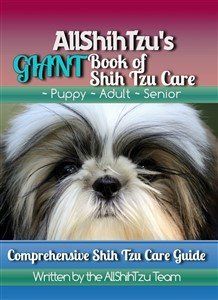Giving OTC Pain Medication to a Shih Tzu
Aspirin, Tylenol, Advil, Aleve
Overview
When considering over-the-counter pain medications for your Shih Tzu, it's important to know which ones are safe and the correct dosages for a toy-sized breed. This section covers:
- Safety of giving Aspirin, Tylenol (acetaminophen), Advil (ibuprofen), or Aleve (naproxen) to a Shih Tzu.
- Appropriate dosing instructions for safe medications.
- Potential side effects.
- Signs of overdose and actions if accidental ingestion occurs.
- Common illnesses and injuries treatable at home.
- Indicators that require professional veterinary care.
Advil (ibuprofen) and Aleve (naproxen)
Not Safe.
Naproxen and Ibuprofen, common over-the-counter pain medications for humans, are nonsteroidal anti-inflammatories (NSAIDs) that do more than just relieve pain. They work by slowing the release of cyclooxygenase, an enzyme that regulates prostaglandins involved in inflammation, fever, pain, and maintaining kidney blood flow, gastrointestinal protection, and blood clotting.
However, these medications can be dangerous for canines, including Shih Tzu dogs, affecting their kidneys, gastrointestinal tract, and blood clotting processes. Even at low doses, Ibuprofen and Naproxen can cause stomach upset, vomiting, diarrhea, skin lesions, changes in appetite, bleeding disorders, and liver or kidney dysfunction. High doses or accidental ingestion can lead to fatal liver or kidney failure.
Both medications are toxic to canines, making it unsafe to give Advil or Aleve to a Shih Tzu of any age.
Aspirin
Can be safe in low does; should be vet approved.
Aspirin, another NSAID like Advil and Aleve, is slightly safer for Shih Tzus but should still be used cautiously. Buffered (coated) aspirin helps protect the stomach lining from NSAID effects, and low doses (like baby Aspirin) are relatively safer for small dogs. Veterinarians may prescribe low-dose, coated Bayer baby Aspirin for mild acute pain or low-grade fever, but other canine-specific NSAIDs are generally safer. When prescribed, it's typically for short-term use (no more than a week) and given with food. The dose for a Shih Tzu under 10 pounds is half a baby Aspirin.
Possible side effects include stomach upset, vomiting, and diarrhea. If these occur, stop giving the Aspirin and consult a veterinarian. Long-term use can lead to stomach ulcers, kidney damage, and blood thinning.
Buffered Aspirin is safer than other human pain relief products and, when used in low doses under veterinary supervision, can be suitable for short-term use in Shih Tzus.
Tylenol (acetaminophen)
Usually safe with proper dosing and vet supervision.
Tylenol (acetaminophen), unlike Aspirin, Advil, and Aleve, is not an NSAID and doesn't affect the cyclooxygenase enzyme. It's used for pain relief and fever reduction but lacks anti-inflammatory properties. High doses can cause irreversible liver damage and can be fatal.
Veterinary approval is essential before giving Tylenol to a Shih Tzu. Vets often prefer canine-approved NSAIDs over human medications. In some cases, a vet may approve a low dose for mild fever or pain.
For Shih Tzus, the typical pill dosage is 5 mg per pound of body weight, administered every 12 hours. A 5-pound Shih Tzu would receive 25 mg, and a 10-pound Shih Tzu, 50 mg. With liquid Tylenol, 1 ml equals 80 mg. For a 10-pound dog needing 50 mg, slightly over half a milliliter is adequate. A 5-pound puppy would require just over a quarter milliliter.
Toxicity symptoms include discolored gums, breathing difficulty, facial swelling, low body temperature, yellowing eyes, and vomiting, potentially leading to coma or death if untreated.
In summary, Tylenol can be safe for a Shih Tzu in very low doses, for short-term use, and with veterinary approval.
Accidental Overdose of Aspirin, Tylenol, Advil and other OTC Pain Meds
All forms of over-the-counter pain medications like Tylenol, Advil, and Aleve are toxic to dogs at anything beyond very low levels. Immediate action is crucial if your Shih Tzu ingests a significant amount, even if they show no poisoning symptoms.
Common signs include vomiting, diarrhea, weakness, pale gums, breathing difficulties, swelling, dry eyes, and dark urine, which can lead to irreversible organ damage, coma, and death.
What to do:
- Induce Vomiting: If the dog is asymptomatic, has no pre-existing health issues, and ingested the pills within the last 50 minutes, inducing vomiting may be recommended. Use hydrogen peroxide at 0.5 ml per pound of body weight, but consult a vet first. Even after inducing vomiting, immediate veterinary care is necessary.
- Veterinary Care: Regardless of the number of pills ingested, take your dog to a vet or animal hospital immediately. Bring the medication bottle and towels for potential vomiting during transport.
Treatment for OTC Medication Overdose:
- A vet may use treatments like n-acetyl-cysteine, Vitamin C, s-adenosyl-methionine, and milk thistle to counteract toxicity and protect the liver.
- Baseline blood work, liver monitoring, IV fluids, oxygen therapy, and possibly blood transfusions may be required.
Early intervention often leads to a good prognosis.
At-home vs Veterinary Treatment
Better Alternatives
In Summary
More Articles:
Shih Tzu Supplies - An organized list of supplies every pet parent should have for their Shih Tzu; this list connects to more detailed articles with tips, advice and specific recommendations. See what your Shih Tzu is missing for optimal health and happiness.
The Best Toys for a Shih Tzu - From durable chew toys for teething pups with itchy gums to companion toys for Shih Tzu that spend time home alone, this article covers all the best types of toys and recommendations.
Shih Tzu Dos and Don'ts - A great summary of the 3 most important 'dos' and the 3 most vital 'don'ts' for optimal healthy, happiness and well-being. It's always a good idea to reassess these elements as your Shih Tzu matures.
Are You an AllShihTzu Member?

